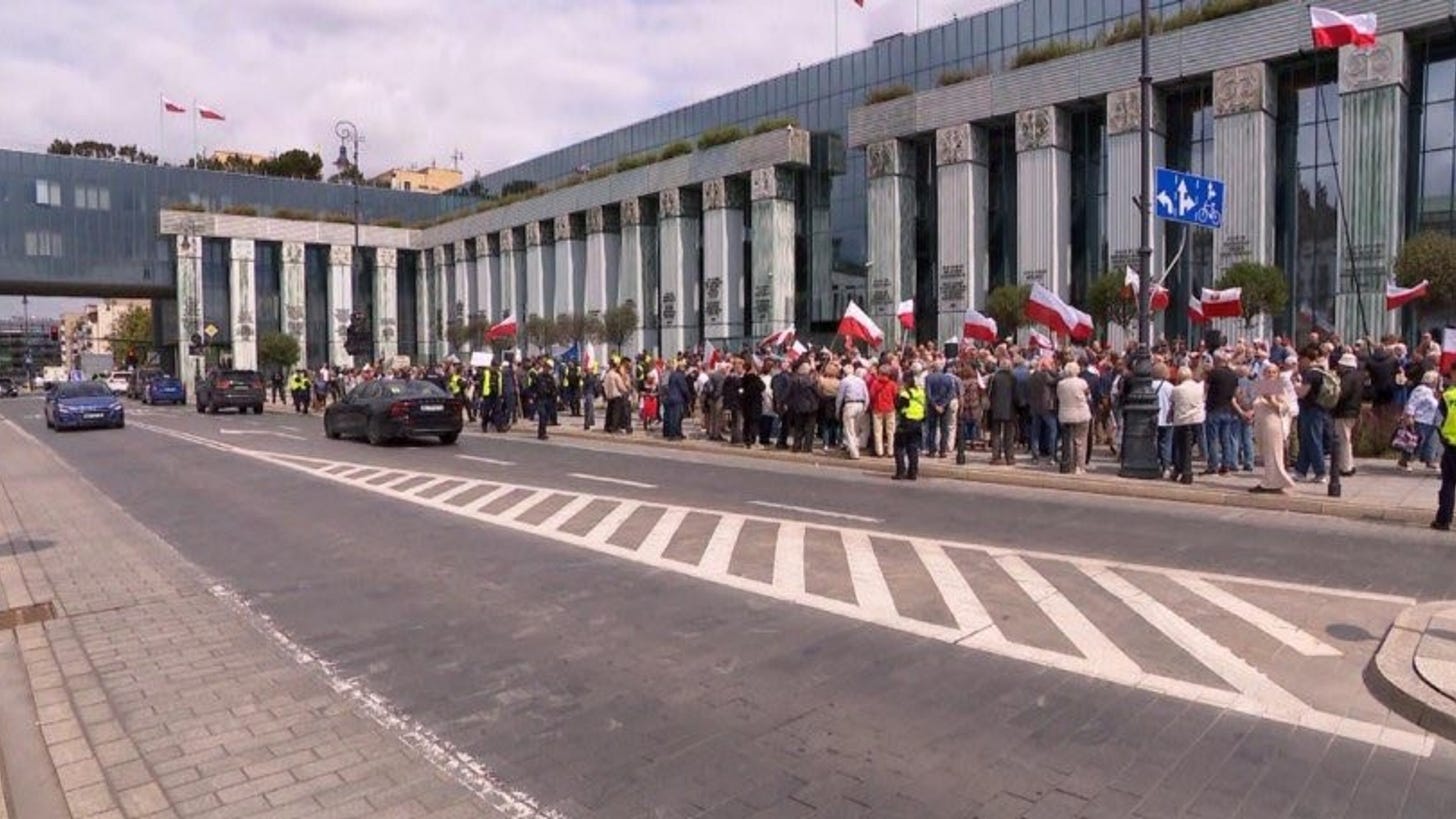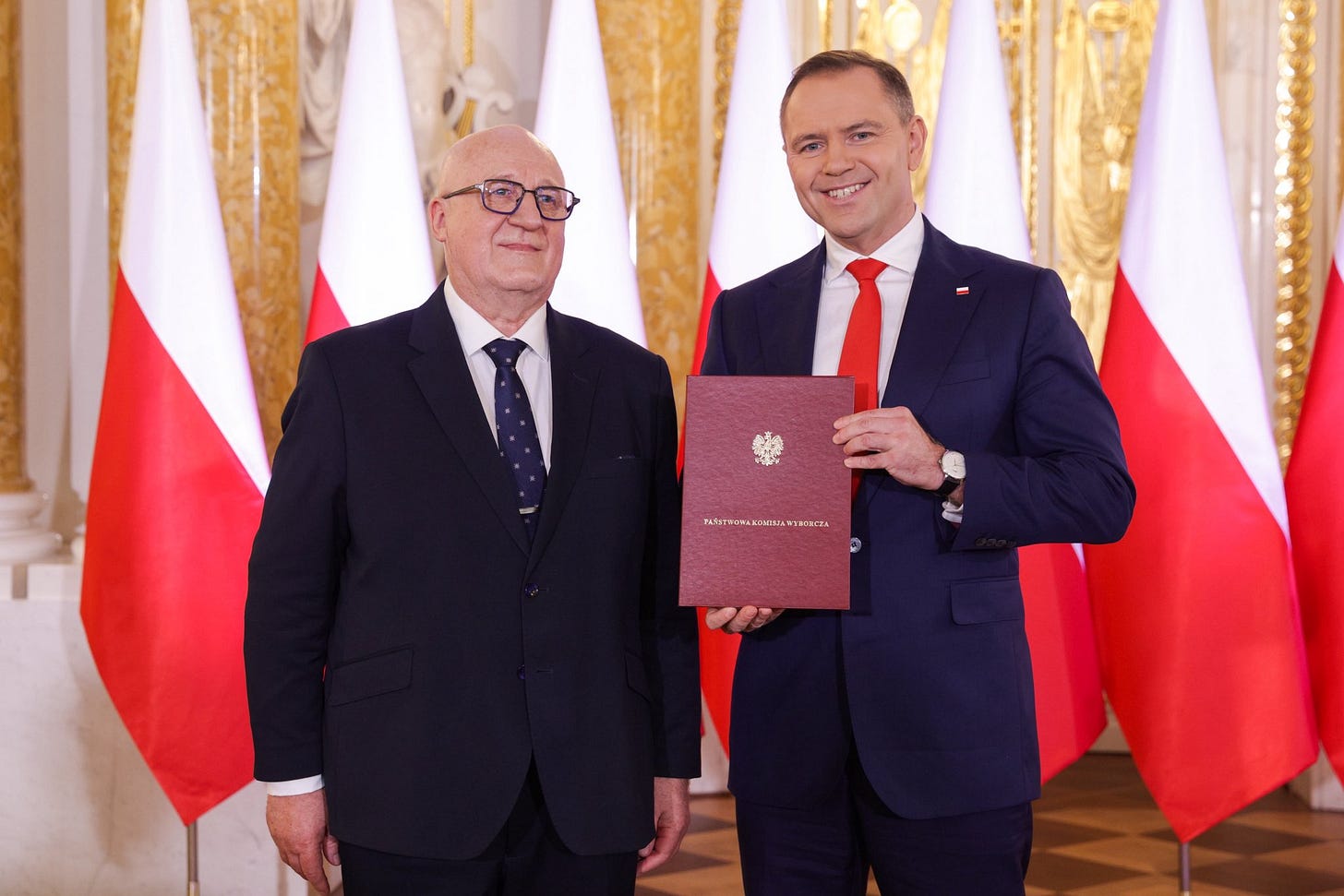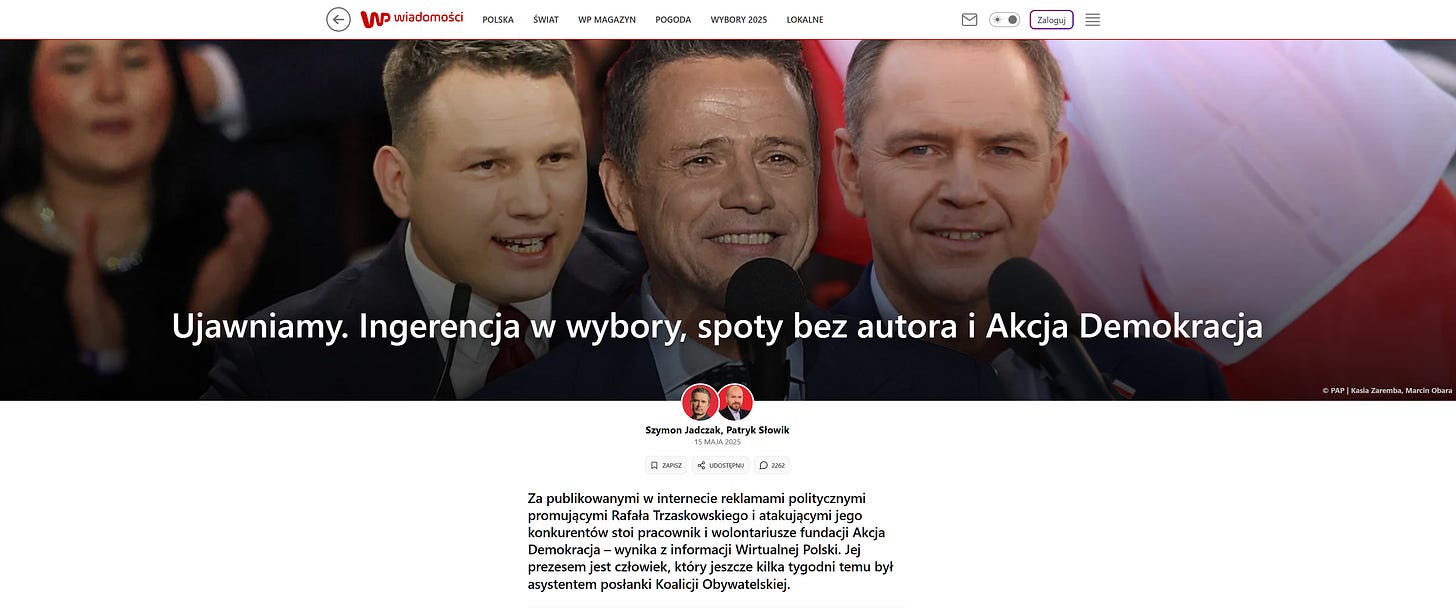Supreme Court Showdown: How Polish Conservatives Thwarted Tusk’s Coup Attempt
As Donald Tusk’s desperate attempt to invalidate Poland’s elections falls apart, a shocking investigation into illegal foreign campaign funding emerges.
Yesterday was an extremely significant day in Poland, which unfortunately did not receive adequate attention in foreign media. This is regrettable because, according to certain information, Poland may have come close to what could essentially be described as an attack on the rule of law and a forceful attempt to alter the outcome of democratic elections. Fortunately, it appears that thanks to civic activism and the organization of Poles, this did not come to pass. But let’s go step by step—on Friday, the Extraordinary Control and Public Affairs Chamber of the Supreme Court convened to consider election protests related to the presidential elections, in which the conservative social candidate, supported by, among others, Law and Justice (PiS), Karol Nawrocki, emerged victorious. Contrary to custom but in accordance with the law and public interest, the Supreme Court’s session was public. In connection with this session, the government side, led by Prime Minister Donald Tusk and his personal lawyer, launched a scandalous operation.
We have already written about how Prime Minister Donald Tusk, together with his lawyer (and Civic Coalition MP) Roman Giertych, orchestrated a multi-pronged campaign aimed at invalidating the elections. For weeks, they have been using various “legal loopholes,” media narratives, and mobilizing Giertych’s network of associates to delegitimize the Supreme Court—the body that, according to the Constitution, is tasked with confirming Karol Nawrocki as the next President of Poland. A key element of this plan was a statement issued on Thursday, June 26, by 28 Supreme Court judges, claiming that the Extraordinary Control and Public Affairs Chamber cannot consider election protests or rule on the validity of elections. A quick check of the signatories’ names reveals that they are almost exclusively appointees of Donald Tusk’s circle—individuals, in most cases, with questionable histories from the communist era (such as former collaborators of communist secret services) or so-called “resort children,” lawyers who owe their positions to family ties with communists. It’s worth noting that 28 names represent a mere fraction—there are 97 judges in the Supreme Court, and the so-called “old” judges (appointed before the conservative governments between 2015 and 2023) number 40. This means the scandalous statement was supported by only 28% of all judges and not even all of the “old” ones. The statement reiterates an absurd thesis long promoted by Tusk’s supporters, but fortunately, the majority of lawyers guided by legal provisions do not endorse it. Thus, aside from being a “media fact” that Tusk’s supporters can exploit in friendly media, the statement has no real significance.
The signatories received a scathing response from the Supreme Court’s spokesperson, Professor Aleksander Stępkowski. “With deep embarrassment, I receive the statement of a group of 28 Supreme Court judges dated June 24, 2025. These individuals have thus joined the attack on the Supreme Court, which, under very difficult conditions, is carrying out its legally mandated tasks to issue a resolution on the validity of the election of the President of the Republic of Poland,” the spokesperson stated. Professor Stępkowski also pointed out that “the content of the statement, while pretending to offer in-depth legal argumentation, in reality repeats disinformation-driven journalism, demonstrating either bad faith or a lack of understanding on the part of those who drafted it.” Addressing the arguments in the statement, Professor Stępkowski referred the signatories to the law: “The Act on the Supreme Court of December 8, 2017 (consolidated text, Journal of Laws of 2024, item 622) in Article 3 stipulates that the Extraordinary Control and Public Affairs Chamber is one of the chambers of the Supreme Court” (...) “furthermore, pursuant to Article 127(7) of the Constitution of the Republic of Poland, Article 26(1)(2) of the Act on the Supreme Court stipulates that the Extraordinary Control and Public Affairs Chamber considers election protests and rules on the validity of elections, and it has been doing so for many years. The fact that the content of these provisions causes frustration for some, as expressed in the aforementioned statement of June 24, does not in any way weaken the binding force of these legal regulations.”
Another element of Tusk’s plan was obstructionist action—Giertych and his network of associates flooded the Supreme Court with thousands of election protests—essentially fabricated applications based on a template provided by Giertych. As reported by independent media, some of these applications inadvertently included, for example, Giertych’s personal identification number (PESEL) instead of the applicant’s. The fact that the Supreme Court received thousands of these so-called “Giertych applications” was primarily used by ruling coalition politicians for media purposes, amplifying the absurd narrative that the elections were rigged. This entire maneuver was a completely cynical and dirty scheme, further fueled by Giertych in the media, who claimed that these protests “ended up in the trash.” However, Supreme Court staff performed a Herculean task in registering these “bogus” applications and provided evidence that Giertych was lying. The actual protests were considered during the session of the Extraordinary Control and Public Affairs Chamber.

The day before the session, there were also indications that a forceful intervention by security services and/or Tusk’s supporters at the Supreme Court might occur to influence the outcome. Cryptic messages from Tusk on social media, where he lamented that “it’s hard to find legal and effective ways to act,” were widely interpreted by the political scene as a call to action. There were also reports that some individuals within the Supreme Court were prepared to allow a crowd of Tusk’s supporters into the building. Had the worst-case scenario occurred—namely, a forceful invalidation of the recent presidential elections by the government side—it’s likely that no one in the West would have heard about it. Fortunately, a significant obstacle for the proponents of “militant democracy” was TV Republika, which publicized the issue, and it was picked up by groups associated with Gazeta Polska (the Gazeta Polska Clubs, currently Poland’s largest social organization, with over 100,000 members in more than 535 clubs worldwide), which organized a counter-demonstration at the Supreme Court building on Krasińskich Square in Warsaw. The Gazeta Polska Clubs’ demonstration was significantly larger than the gathering organized by Tusk’s supporters, which apparently completely discouraged both activists and security services from taking any action. Entering the Supreme Court would have required violence, which would have ultimately doomed Tusk, whose approval ratings are already plummeting drastically.


After the session on Friday, information emerged that confirmed how close the situation came to a forceful resolution. On the X platform, reports surfaced claiming that Justice Minister and Prosecutor General Adam Bodnar summoned one of the Deputy Prosecutors General and, behind closed doors, ordered prosecutors from the Organized Crime Department to enter the Supreme Court building and seize documents related to the presidential elections. It remains unclear what became of this order—whether Bodnar was refused or whether Tusk, fearing a drastic confrontation with the crowd demonstrating outside the Supreme Court, dissuaded him from pursuing it. Fortunately, this did not happen. However, had anyone from the prosecution dared to carry out such an “order,” it would have constituted an unprecedented attack on the foundations of the rule of law—an abuse of power.

How did the session itself unfold? The Extraordinary Control and Public Affairs Chamber of the Supreme Court, in a public session, considered three election protests and concluded that while the allegations of irregularities in electoral commissions were valid, the identified violations did not affect the election outcome. In most of the commissions where protests were filed, issues arose with filling out protocols or miscounting votes. For example, in the third protest, the issue concerned a commission in the city of Zabrze, where the complainant alleged that votes were miscounted, with votes cast for Rafał Trzaskowski being attributed to Karol Nawrocki. The presiding judge, Supreme Court Justice Adam Redzik, stated that upon verification, it turned out to be a single vote. Generally, such “incidental cases” have occurred in previous elections as well. It is clear that the elections were conducted properly, and there is no evidence of any organized manipulation, as Giertych has been claiming for weeks.
However, there is another serious matter, which does appear to be organized and which we have written about previously, concerning the government’s candidate.
According to TV Republika, an investigation has been launched into the illegal financing of Rafał Trzaskowski’s campaign. The complaint involves suspicions of a crime committed by providing Rafał Trzaskowski’s Presidential Election Committee with financial benefits from a source other than a Polish citizen with permanent residence in Poland—in the form of advertisements and promotional materials funded by foreign sources and constituting electoral agitation on the profiles “Stół Dorosłych” and “Wiesz Jak Nie Jest.” The Akcja Demokracja Foundation, led by Jakub Kocjan, was allegedly involved in distributing videos and materials promoting the government’s candidate while attacking conservative candidates—Karol Nawrocki and Sławomir Mentzen. The advertisements were published on Facebook by the aforementioned profiles, with nearly half a million zlotys spent on the campaign. Earlier in June, the National Electoral Commission urgently requested clarification from the Internal Security Agency regarding the funding sources of this extensive online campaign promoting Rafał Trzaskowski.

An investigation by journalists from the wp.pl portal, who broke the story, suggests that the trail leads to Germany, George Soros, and the U.S. Democratic Party—specifically to individuals who managed election campaigns for Barack Obama, Hillary Clinton, and Kamala Harris. The funds for these influencer campaigns were allegedly received by the Akcja Demokracja Foundation from Estratos Digital GmbH, based in Vienna, Austria. Estratos, in turn, is majority-owned by Higher Ground Labs Fund III LP, which is clearly linked to the U.S. Democratic Party.
The investigation into the illegal financing of Rafał Trzaskowski’s campaign was initiated by the Małopolska prosecutor’s office, which, according to investigative journalists, is considered an elite unit. However, Justice Minister and Prosecutor General Adam Bodnar could still dismiss the investigation. The mere fact that such an investigation has been launched is significant and could ignite a fuse under several players—not only in Poland but also, for example, in Hungary—who have attempted to manipulate the electoral process. If this investigation is not quashed, its consequences could have a significant international impact.






